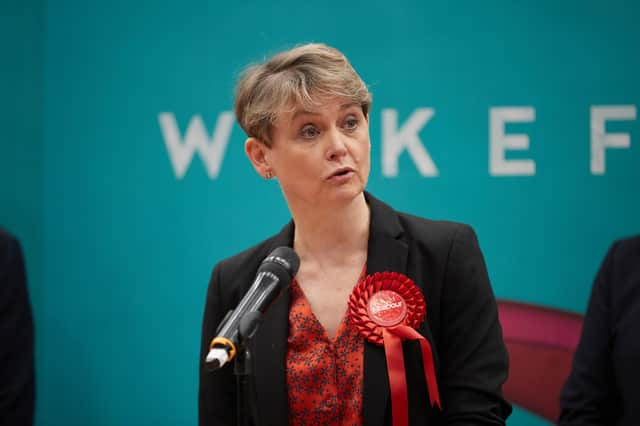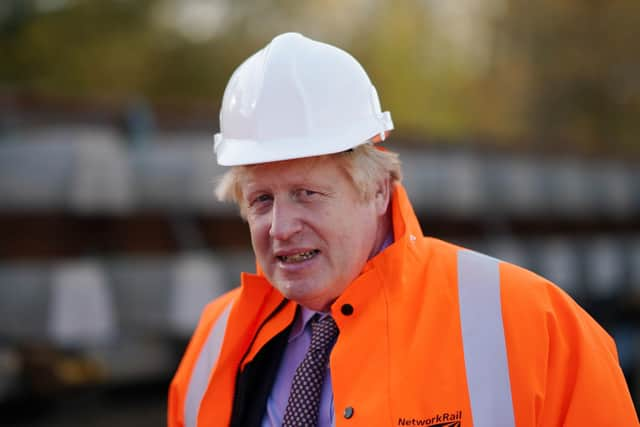How red wall Tory MPs will draw hope from voters in Yvette Cooper’s Normanton, Pontefract and Castleford seat – Adam Hawksbee


But Labour still faces an uphill struggle. The long-term demographic changes that shaped the last election and toppled the Red Wall are still happening and, more often than not, they favour the Conservatives.
New Onward research using the same methods that identified the Red Wall before it fell has found that there are more seats that could switch to the Conservatives next time. Of the key battleground seats, six in 10 are in northern England and several key ones are in Yorkshire, most notably Shadow Home Secretary Yvette Cooper’s seat – Normanton, Pontefract and Castleford.
Advertisement
Hide AdAdvertisement
Hide AdIn these seats, the underlying demographics – such as the age, ethnicity, education and housing tenure of the local population – suggest they are becoming more Conservative over time, and should fall at the next election. Even with a national swing away from the Conservatives next time, the gains they stand to make in the North would cushion them from a serious loss of seats elsewhere.


This shift to the North doesn’t have to come at a cost elsewhere. Despite anxiety among many long-standing Tory MPs in the South, our research suggests that there is no such thing as a Southern “Blue Wall” that is ready to fall. Instead, there are at most a dozen or so seats likely to switch to other parties at the next election – particularly in London and its leafy commuter belt.
But from the Conservatives’ perspective, these could be more than compensated for by potential wins in northern England. This doesn’t mean that the South will stay Conservative forever, but it is unlikely we will see anything like the dramatic toppling of Labour’s Red Wall in 2019.
So the challenge for the Conservatives will be to extend – and consolidate – their support in northern England and the Midlands while defending their historic heartlands in the South. This means that when developing new policies the party will need to prioritise voters in Yorkshire and across the North even more than in the Home Counties. The same principle applies to selecting future leaders.
Advertisement
Hide AdAdvertisement
Hide AdThis won’t be plain sailing for the Conservatives. Partygate has damaged the Conservative brand, but we don’t yet know how deeply. Opposition parties are also getting smarter about how they deploy their campaigning resources. We heard earlier this month that Labour and the Lib Dems have agreed a non-aggression pact in some seats in an attempt to replace the Conservative incumbent with a “progressive” alternative.
Our research suggests that this type of Lib-Lab pact is unlikely to work. People don’t like being told who to vote for and many won’t vote the way Labour and the Lib Dems expect them to.
Even if the perfect pact could be constructed based on the 2019 result, the Conservatives would still hold 321 seats – exactly half of voting MPs. Labour would still win only 233 seats and the Lib Dems just 24.
Expect to see the return of the “coalition of chaos” slogan at the next election, with the Conservatives warning of the prospect of a three way Labour-Lib Dem-SNP deal.
Advertisement
Hide AdAdvertisement
Hide AdDespite its current poll lead, Labour will find it impossible to return to government without extending its support beyond liberal-left voters. Impregnable strongholds in London and Merseyside are of little use to the party while it struggles to speak to the rest of the country.
The real threat to the Conservatives at the next election would come from “NewKip” – a possible resurgent right-wing populist party – that could cost the Conservatives as many as 53 seats.
This would wipe out their current majority and result in a hung parliament. In this event, many Yorkshire seats would likely change hands – not to this hypothetical new party, but back to Labour.
Party politics is ever changing, and no more so than in recent years. The strategic choice for the Conservatives is to embrace change and solidify their new Northern heartlands. A successful pivot North could see the party in Government for many years to come.
Advertisement
Hide AdAdvertisement
Hide AdAdam Hawksbee is deputy drector of Onward think tank and head of its levelling up programme.
Support The Yorkshire Post and become a subscriber today. Your subscription will help us to continue to bring quality news to the people of Yorkshire. In return, you’ll see fewer ads on site, get free access to our app, receive exclusive members-only offers and access to all premium content and columns. Click here to subscribe.
Comment Guidelines
National World encourages reader discussion on our stories. User feedback, insights and back-and-forth exchanges add a rich layer of context to reporting. Please review our Community Guidelines before commenting.